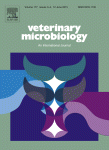Ver ítem
- xmlui.general.dspace_homeCentros e Institutos de InvestigaciónCICVyA. Centro de Investigación en Ciencias Veterinarias y AgronómicasInstituto de BiotecnologíaArtículos científicosxmlui.ArtifactBrowser.ItemViewer.trail
- Inicio
- Centros e Institutos de Investigación
- CICVyA. Centro de Investigación en Ciencias Veterinarias y Agronómicas
- Instituto de Biotecnología
- Artículos científicos
- Ver ítem
Analysing nonsynonymous mutations between two Mycobacterium bovis strains with contrasting pathogenic profiles
Resumen
Mycobacterium bovis (M. bovis) is the causative agent of bovine tuberculosis, a chronic infectious disease that can affect cattle, other domesticated species, wild animals and humans. This disease produces important economic losses worldwide. Two M. bovis strains (04-303 and 534) have been isolated in Argentina. Whereas the 04-303 strain was isolated from a wild boar, the 534 strain was obtained from cattle. In a previous study, six weeks after infection,
[ver mas...]
Mycobacterium bovis (M. bovis) is the causative agent of bovine tuberculosis, a chronic infectious disease that can affect cattle, other domesticated species, wild animals and humans. This disease produces important economic losses worldwide. Two M. bovis strains (04-303 and 534) have been isolated in Argentina. Whereas the 04-303 strain was isolated from a wild boar, the 534 strain was obtained from cattle. In a previous study, six weeks after infection, the 04-303 strain induced 100% mortality in mice. By contrast, mice infected with the 534 strain survived, with limited tissue damage, after four months. In this study we compared all predictive proteins encoded in both M. bovis genomes. The comparative analysis revealed 141 polymorphic proteins between both strains. From these proteins, nine virulence proteins showed polymorphisms in 04-303, whereas five did it in the 534 strain. Remarkably, both strains contained a high level of polymorphism in proteins related to phthiocerol
dimycocerosate (PDIM) synthesis or transport. Further experimental evidence indicated that only mutations in the 534 strain have an impact on PDIM synthesis. The observed reduction in PDIM content in the 534 strain, together with its low capacity to induce phagosome arrest, may be associated with the reported deficiency of this strain to replicate and survive inside bovine macrophages. The findings of this study could contribute to a better understanding of pathogenicity and virulence aspects of M. bovis, which is essential for further studies aiming at developing new vaccines and diagnostic techniques for bovines.
[Cerrar]

Autor
Bigi, María Mercedes;
Vazquez, Cristina Lourdes;
Castelão, Ana Beatriz C.;
Garcia, Elizabeth Andrea;
Cataldi, Angel Adrian;
Jackson, Mary;
McNeil, Michael;
Soria, Marcelo Abel;
Zumarraga, Martin Jose;
Cabruja, Matias;
Gago, Gabriela;
Blanco, Federico Carlos;
Nishibe, Christiane;
Almeida Junior, Nalvo Franco de;
Araujo, Flabio Ribeiro de;
Bigi, Fabiana;
Fuente
Veterinary microbiology 239 : 108482. (December 2019)
Fecha
2019-12
Editorial
Elsevier
ISSN
0378-1135
Formato
pdf
Tipo de documento
artículo
Palabras Claves
Derechos de acceso
Restringido
 Excepto donde se diga explicitamente, este item se publica bajo la siguiente descripción: Creative Commons Attribution-NonCommercial-ShareAlike 2.5 Unported (CC BY-NC-SA 2.5)
Excepto donde se diga explicitamente, este item se publica bajo la siguiente descripción: Creative Commons Attribution-NonCommercial-ShareAlike 2.5 Unported (CC BY-NC-SA 2.5)

